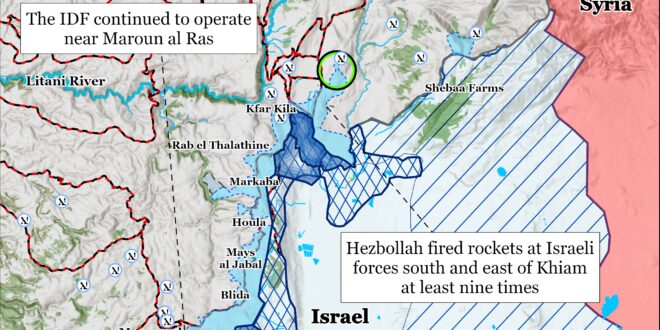The continued looting of humanitarian aid trucks demonstrates that Hamas’ internal control remains limited and severely weakened. Armed groups looted 98 of 109 humanitarian aid trucks that entered the southern Gaza Strip via the Kerem Shalom border crossing on November 16.[1] It is unclear if these armed groups are affiliated with any Palestinian militia group, but the armed men were likely part of organized criminal groups that have replaced Hamas’ police forces in much of the Strip.[2] Hamas claimed that it conducted a joint operation with local family groups in which Hamas and locals killed 20 individuals who had looted the vehicles.[3] The fact that Hamas had to cooperate with these local groups indicates that Hamas’ control over the Gaza Strip remains weak. Hamas has long fought local families and organized criminal groups for control over the Gaza Strip. The UNRWA spokesperson said that the aid convoys are not allowed to maintain any armed guards and that they usually attempt to drive fast to avoid ambushes by armed groups.[4] The IDF has recently taken several steps to increase the flow of humanitarian aid into the Gaza Strip, including plans to reopen the Kissufim border crossing and facilitate the transfer of aid trucks into the northern Gaza Strip.[5] CTP-ISW has not observed the IDF escorting any aid itself, however.
Israeli Prime Minister Benjamin Netanyahu told the Knesset Foreign Affairs and Defense Committee that he would reject any ceasefire in the Gaza Strip that requires a full IDF withdrawal.[6] Netanyahu reiterated this position after a meeting with his security chiefs. Shin Bet chief Ronen Bar, Mossad Director David Barnea, and the IDF Chief of Staff Herzi Halevi recommended that the government agree to a ceasefire including an IDF withdrawal to return the hostages.[7] Netanyahu said that Hamas only wants a deal so that the IDF will leave and Hamas can regain power, which Netanyahu said he would not allow.[8] Netanyahu said that the IDF had not sufficiently degraded Hamas’ governance capabilities. Netanyahu further emphasized the need to maintain complete operational control over the Gaza Strip, especially the Philadelphi Corridor, to retain IDF’s freedom of movement across the strip.[9]
Hamas denied that it has relocated from Qatar to Turkey.[10] An unspecified Turkish diplomat also rejected claims that Hamas’ political leadership has relocated from Qatar to Turkey.[11] Israeli media reported on November 17 that unspecified Arab and Israeli sources claimed that Hamas’ political leadership had relocated from Qatar to Turkey.[12]
Hezbollah responded to a US-proposed ceasefire draft to end Hezbollah’s war with Israel.[13] Hezbollah officials delivered the group’s response on November 17 to Lebanese Parliament Speaker Nabih Berri, who is reportedly discussing the proposed changes with Lebanese Caretaker Prime Minister Najib Mikati.[14] Sources ”close to Hezbollah” told Al Jazeera that Hezbollah is approaching the draft in a “positive manner” and with flexibility.[15] A Lebanese government source added to Al Jazeera that the clause allowing Israel’s right to self-defense needed to be less vague.[16] An Israeli Army Radio correspondent reported that Israeli Prime Minister Benjamin Netanyahu desires a ceasefire deal that keeps Hezbollah away from Israel’s northern border, preserves Israeli freedom of action in Lebanon, and stops Hezbollah from re-arming through Syria.[17] Hezbollah Secretary General Naim Qassem said in early November that Israel would have to end operations in Lebanon before Hezbollah would agree to indirect ceasefire talks and stated that Hezbollah would require the “full protection of Lebanese sovereignty without any reduction” in negotiations.[18] US presidential envoy Amos Hochstein traveled to Beirut on November 18 to review the proposal.[19] US officials told Axios that Hochstein would only travel if there were ”greater clarifications about the Lebanese position,” indicating mediators think that there is progress on the deal.[20] It is unclear at the time of writing when Israel will receive Hezbollah’s response.
Israel has continued air interdiction operations in the Qusayr area of Syria that are designed to disrupt Hezbollah supply lines. Satellite imagery confirms that Israeli airstrikes have destroyed 15 bridges along the Syria-Lebanon border. These 15 bridges are crucial to Hezbollah’s ground line of communication that transports weapons and fighters from Syria and Iraq.[21] The Syrian regime confirmed on November 13 that Israeli airstrikes destroyed several bridges over the Orontes River in Qusayr. [22] Local Syrian sources said that Israeli strikes destroyed all seven river-spanning bridges.[23] The IDF’s destruction of these bridges is designed to impede Hezbollah’s resupply of its depleted munitions stocks. Hezbollah and Iran could presumably use other routes, though some routes may be less optimal and more dangerous. The IDF said that its airstrikes in Syria harm Hezbollah’s weapons transfer apparatus, particularly Hezbollah Unit 4400, which works with Iran to arm Hezbollah.[24]
Key Takeaways:
- Hamas Control in the Gaza Strip: The continued looting of humanitarian aid trucks demonstrates that Hamas’ internal control remains limited and severely weakened. Armed men, likely part of criminal organizations, looted 98 of 109 humanitarian aid trucks that entered the southern Gaza Strip via the Kerem Shalom border crossing on November 16.
- Gaza Strip Ceasefire: Israeli Prime Minister Benjamin Netanyahu told the Knesset Foreign Affairs and Defense Committee that he would reject any ceasefire in the Gaza Strip that requires a full IDF withdrawal. Netanyahu reiterated this position after a meeting with his security chiefs in which the chiefs argued in support of a ceasefire.
- Hamas Relocation: Hamas denied that it has relocated from Qatar to Turkey. An unspecified Turkish diplomat also rejected claims that Hamas’ political leadership has relocated from Qatar to Turkey.
- Lebanon Ceasefire: Hezbollah responded to a US-proposed ceasefire draft to end Hezbollah’s war with Israel.
- Israeli Interdiction of Hamas Supplies: Israel has continued air interdiction operations in the Qusayr area of Syria that are designed to disrupt Hezbollah supply lines. Satellite imagery confirms that Israeli airstrikes have destroyed 15 bridges along the Syria-Lebanon border. These 15 bridges are important to Hezbollah’s ground line of communication that transports weapons and fighters from Syria and Iraq.
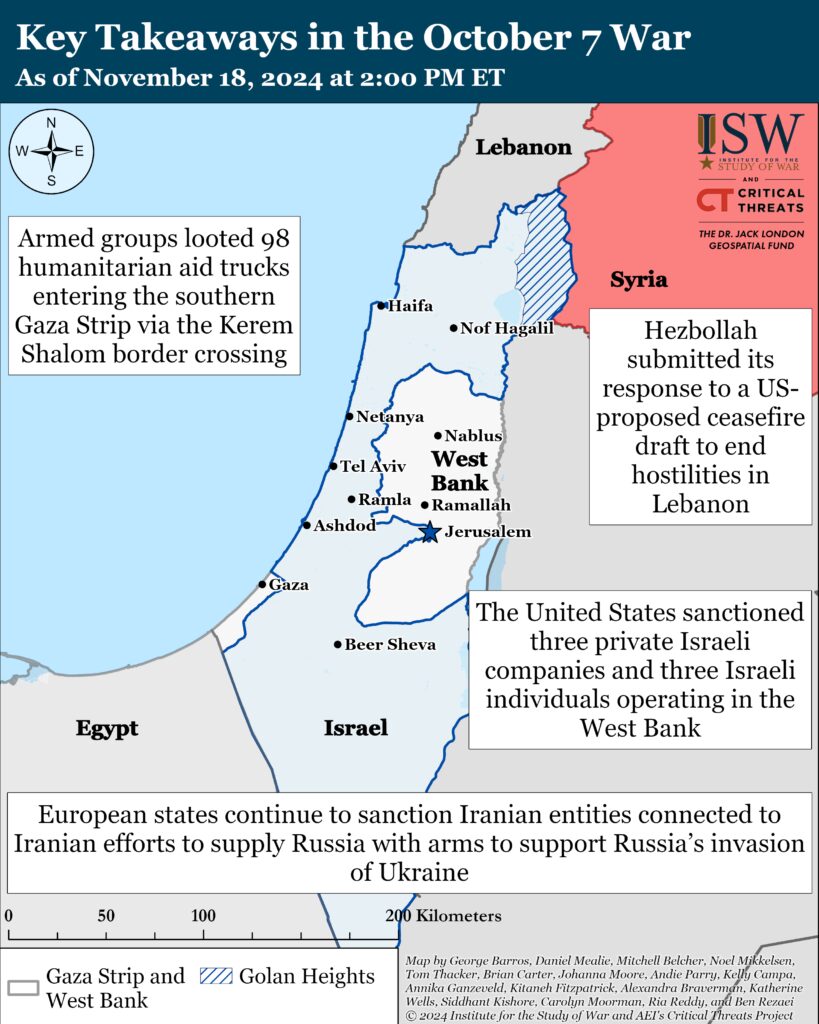
Gaza Strip:
Axis of Resistance objectives:
Erode the will of the Israeli political establishment and public to sustain clearing operations in the Gaza Strip
Reestablish Hamas as the governing authority in the Gaza StripThe IDF 162nd Division continued clearing operations in Beit Lahia and Jabalia in the northern Gaza Strip on November 18.[25] The IDF destroyed Palestinian militia infrastructure, located tunnel shafts and weapons, and killed several Palestinian fighters during fighting in Beit Lahia.[26] The IDF also conducted an airstrike targeting two Hamas fighters entering a tunnel shaft in the northern Gaza Strip.[27] Palestinian militias conducted at least five attacks targeting Israeli forces in Beit Lahia.[28]
An Israeli Army Radio correspondent reported that the IDF facilitated the evacuation of approximately 4,000 Gazans from Beit Lahia to southern Gaza City via established routes between November 17 and 18.[29] The IDF estimated that thousands of Gazans still remain in the northern Gaza Strip. The IDF detained “dozens” of Palestinian fighters who were attempting to relocate south of Gaza City via the established evacuation route.[30]
The IDF 99th Division likely continued clearing operations in the central Gaza Strip on November 18. Palestinian militias claimed two attacks targeting Israeli forces east of Bureij refugee camp.[31] Hamas also claimed that one of its snipers hit IDF personnel in Gaza City.[32]
The al Aqsa Martyrs’ Brigades fired rockets targeting an IDF position along the Netzarim Corridor on November 18.[33]
The IDF 143rd Division likely continued clearing operations in Rafah, in the southern Gaza Strip on November 18. A Palestinian journalist reported that the IDF conducted controlled demolitions of civilian infrastructure in areas in Rafah city and Khan Younis.[34]
The Palestinian Islamic Jihad (PIJ) mortared Israeli forces along the Philadelphi Corridor in the southern Gaza Strip on November 18.[35]
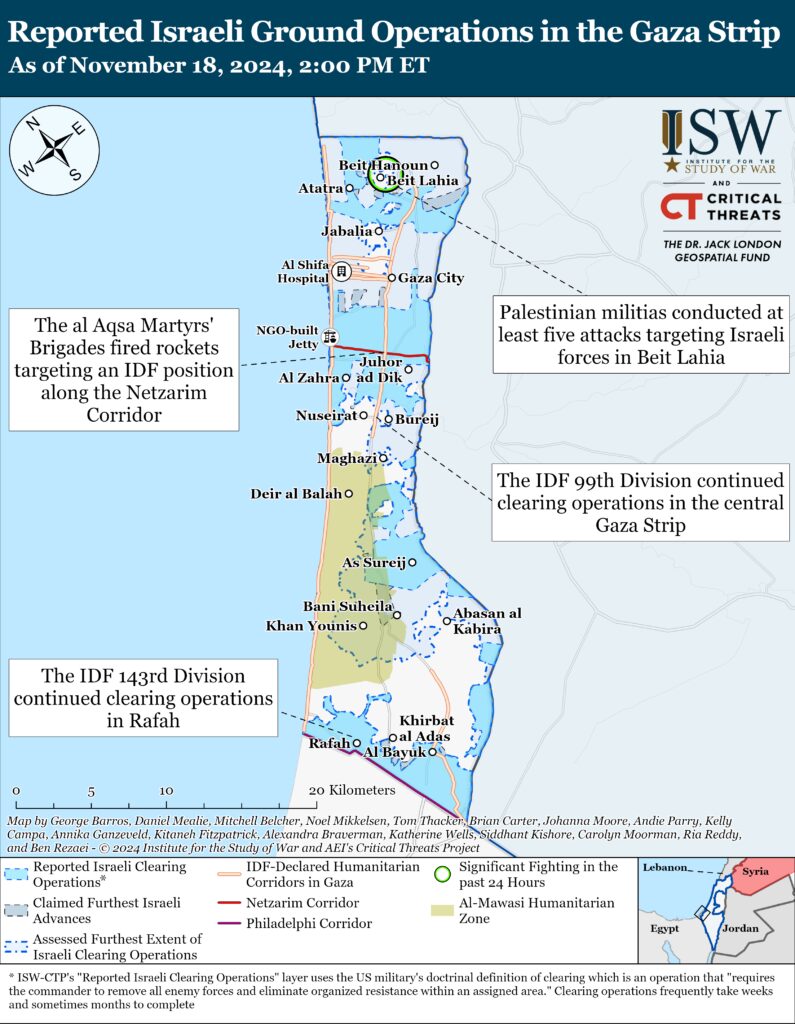
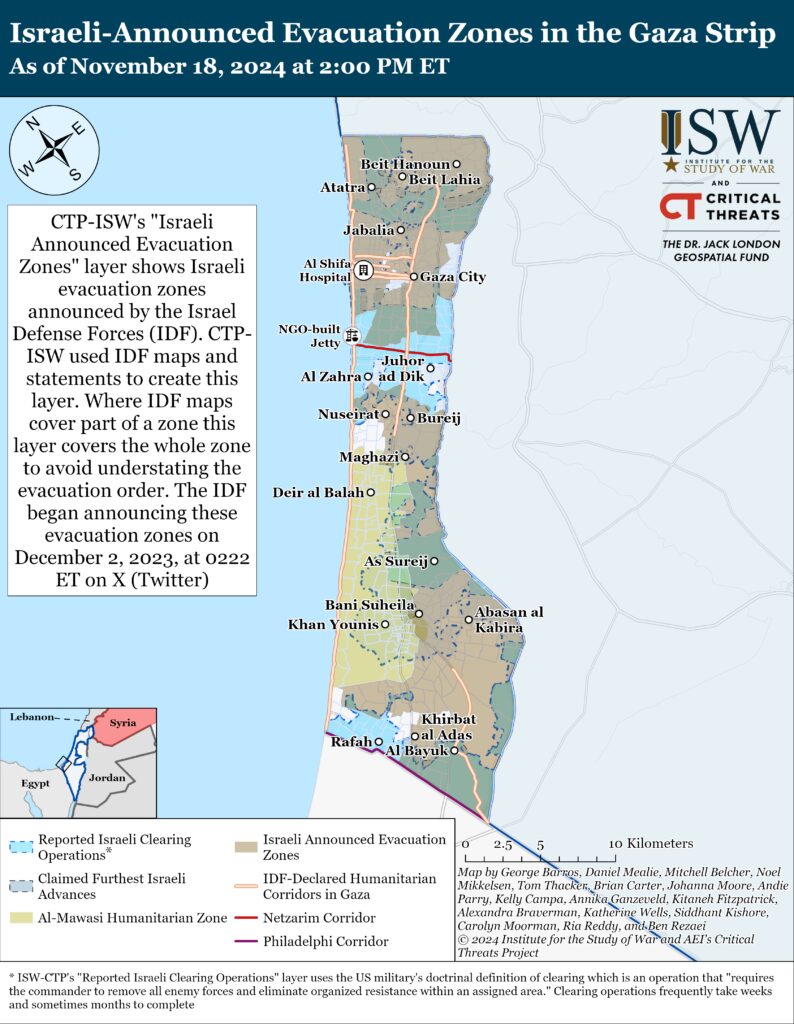
West Bank
Axis of Resistance objectives:
Establish the West Bank as a viable front against IsraelThe United States sanctioned three private Israeli companies and three Israeli individuals on November 18 for violence against civilians, and the destruction or dispossession of property in the West Bank.[36] This marks the first time the United States imposed sanctions on private Israeli building companies in the West Bank.[37] The US Treasury Office of Foreign Assets Control (OFAC) sanctioned the Amana settlement development organization and its subsidiary Binyanei Bar Amana in the West Bank.[38] The Amana settlement development organization is involved with US-sanctioned individuals and the expansion of settlements and illegal outposts in the West Bank.[39] The United Kingdom and Canada previously sanctioned the Amana organization.[40] 88 Democratic lawmakers urged the Biden administration on October 29 to impose sanctions on the Amana organization for providing loans and helping to build illegal outposts in the West Bank.[41] The US State Department also imposed sanctions on three individuals and the Eyal Hari Yehuda Company in the West Bank involved with constructing illegal West Bank settlements and outposts.[42]
The 431st Territorial Brigade confiscated several M-16 rifles and arrested several wanted individuals near Zeita, Tulkarm Governorate, on the Israel-West Bank border.[43] Zeita is located in the ”seam zone” border area between Israel and the West Bank and is less than less than one mile from Israel. The 431st Territorial Brigade is the IDF brigade responsible for Jenin and Tulkarm.
The IDF foiled an attempted car ramming attack against IDF troops on November 18 near al Tawani, Hebron Governorate, in the southern West Bank.[44] The IDF brought the female attacker in for questioning following the attack.[45]
Northern Israel and Lebanon
Lebanese Hezbollah objectives:
End Israeli operations in the Gaza Strip
Survive the October 7 War as a capable political and military organization with control over LebanonHezbollah rocket artillery cells attempted to halt Israeli advances toward Khiam on November 18. Hezbollah claimed nine rocket attacks targeting IDF personnel south of Khiam and on the city’s eastern outskirts.[46] Lebanese sources reported that Hezbollah also engaged Israeli forces with small arms and rocket-propelled grenades south and east of Khiam.[47] A Hezbollah-affiliated correspondent reported that Israeli forces advanced along two axes towards the southern and eastern outskirts of Khiam on November 16, including by advancing from al Wazzani towards Ain Arab.[48] Commercially available satellite imagery captured on November 17 showed flattened terrain and vehicle tracks south of al Wazzani, indicating that Israeli armor operated in the area. Lebanese sources reported that the IDF fired artillery at least six separate times and conducted airstrikes in the Khiam area in conjunction with the IDF’s advance.[49]
The IDF continued to operate in Maroun al Ras on November 18. Hezbollah fired rockets targeting Israeli forces on the eastern outskirts of Maroun al Ras.[50] The IDF 36th Division has historically operated in Maroun al Ras.[51]
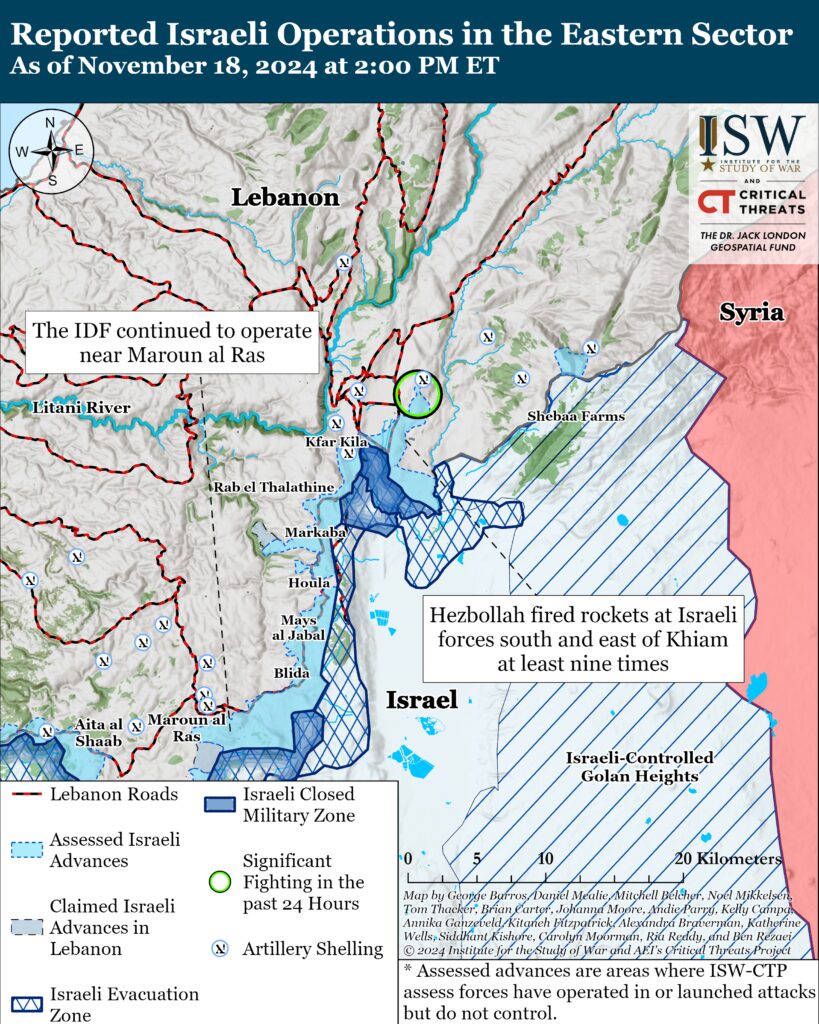
The IDF 226th Paratroopers Brigade (146th Division) cleared Hezbollah infrastructure near Alma al Chaab, southwestern Lebanon.[52] Israeli forces uncovered dozens of above-ground and underground fighting positions that were stocked with multi-barreled launchers, and mortar and rocket stockpiles in rural and urban areas.[53] Geolocated footage posted on November 18 shows Israeli forces operating in Alma al Chaab.[54]
Hezbollah claimed to attack Israeli forces operating in southwest Lebanon. Geolocated footage posted on November 18 shows Israeli forces operating in Tayr Harfa.[55] Hezbollah fired an anti-tank guided missile (ATGM) at an Israeli tank between Tayr Harfa and Jibbain on November 17.[56] Hezbollah claimed that the ATGM destroyed the tank, killing and injuring the crew.[57] Hezbollah did not provide any evidence to substantiate these claims and has repeatedly lied about the success of its forces since this campaign began. A Hezbollah-affiliated journalist also reported small arms engagements between Hezbollah and the IDF in Chama, west of Tayr Harfa.[58]
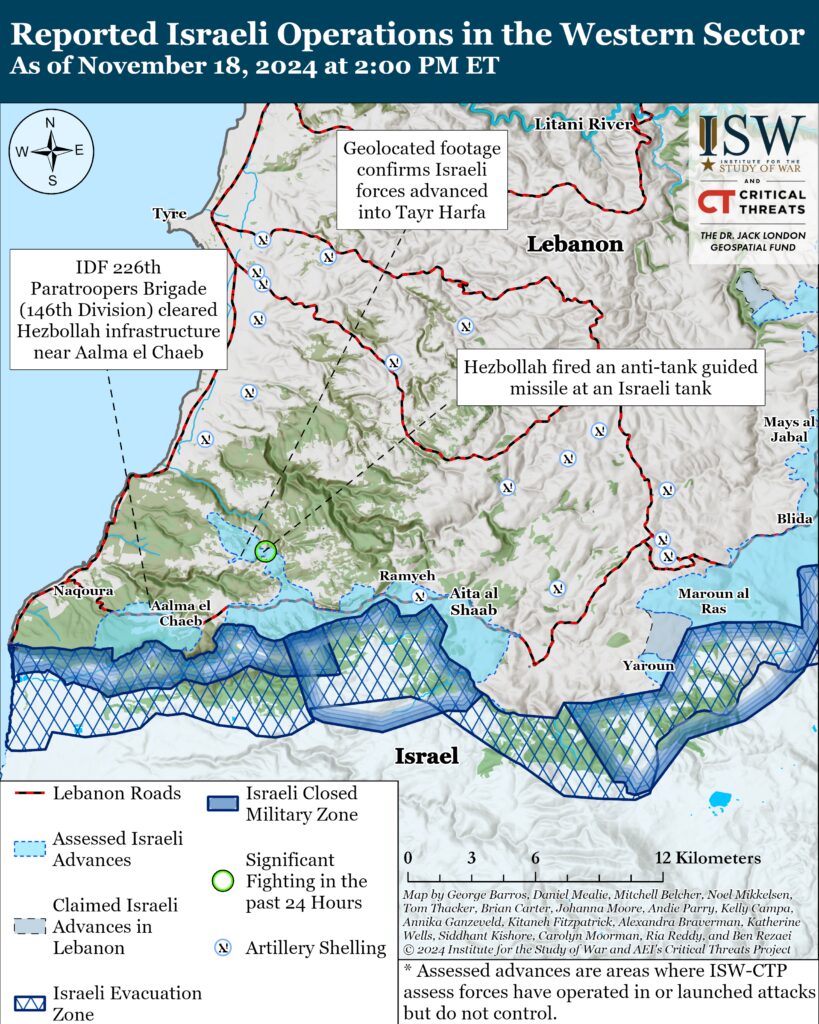
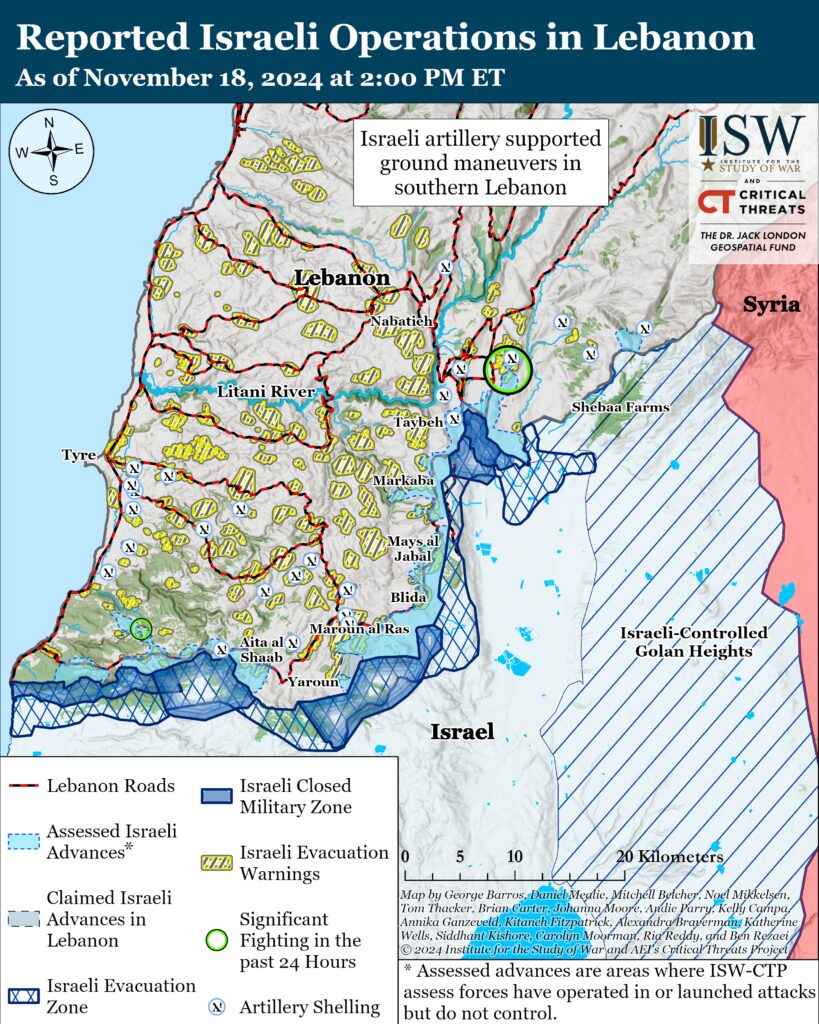
The IDF has likely continued its air campaign targeting Hezbollah senior leadership and infrastructure in Beirut since CTP-ISW’s data cutoff on November 17.[59] Lebanese media reported that IDF struck a building in the Zuqaq al Balat neighborhood in northern Beirut.[60] The IDF did not immediately confirm it conducted the attack and did not issue evacuation orders ahead of the strike. Israel’s air campaign has mainly focused on sites in Beirut’s southern suburbs, including in Haret Hreik, Burj al Barajneh, Hadath, and al Chiyah.[61] Israeli Army Radio recirculated Lebanese reports that the IDF targeted a Hezbollah operations room, but CTP-ISW is unable to confirm the target at this time.[62]
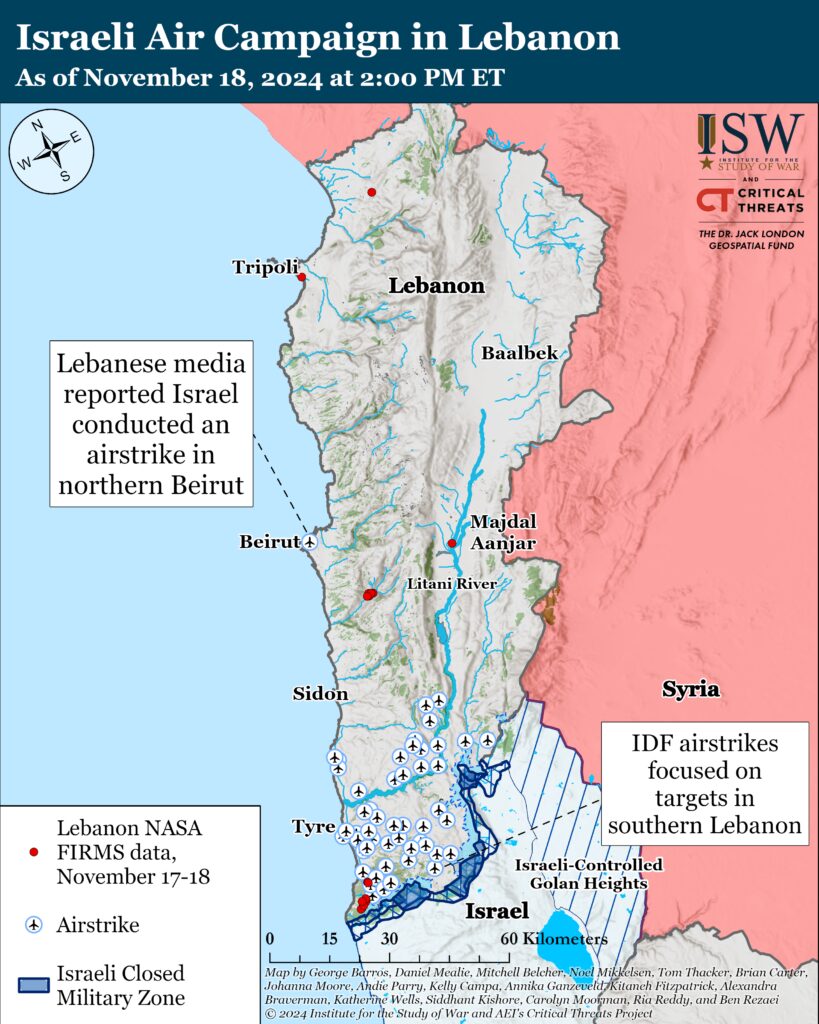
This map illustrates individual Israeli air and artillery strikes based on local Lebanese reporting. This map depicts strikes reported from 2:00pm ET on November 17 to 2:00pm ET on November 18. This map is not exhaustive. CTP-ISW cannot independently verify the locations of Israeli strikes.
Hezbollah has conducted at least 13 attacks into Israel since CTP-ISW’s last data cutoff on November 17.[63] Hezbollah conducted at least six attacks targeting IDF personnel along the Israel-Lebanon border.[64] Hezbollah fighters launched two rocket attacks targeting IDF personnel in Kiryat Shmona, across the border from where Israeli forces are conducting clearing operations in Markaba, southeastern Lebanon.[65] Hezbollah launched an anti-tank guided missile at IDF personnel in Shtula, northwestern Israel.[66]
Hezbollah conducted attacks targeting multiple IDF sites and towns in northern Israel.[67] Hezbollah fighters fired rockets targeting an IDF Golani Brigade administrative headquarters north of Acre.[68] Hezbollah also launched one-way attack drones targeting Golani Brigade training camps at the Regavim base, southeast of Haifa.[69] Hezbollah stated this attack was part of its ”Khaybar” operations, which are meant to retaliate for Israel’s killing of Hassan Nasrallah.[70] Hezbollah also conducted a drone attack targeting Israeli forces at the Ya‘ara Barracks, in northwestern Israel.[71] Hezbollah claimed that it launched two rocket attacks targeting the towns of Hosen and Kerem Ben Zimra in northwestern Israel for the first time.[72]
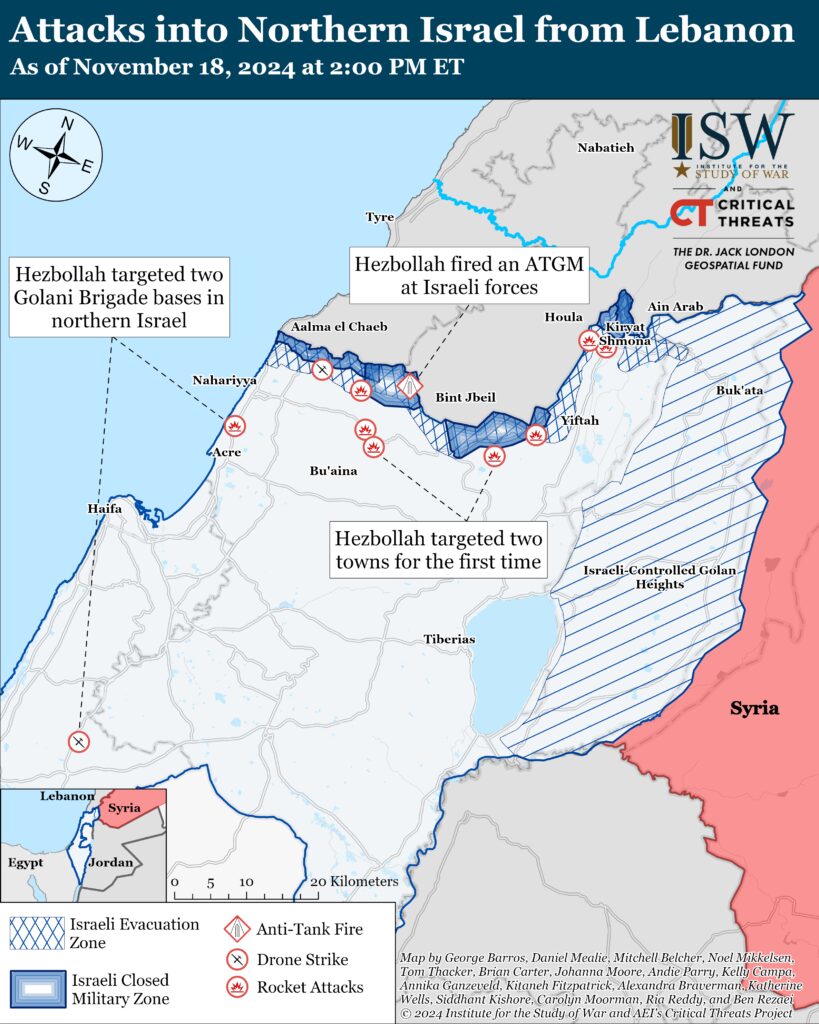
Iran and the Axis of Resistance
The Islamic Resistance in Iraq—a coalition of Iranian-backed Iraqi militias—claimed a drone attack targeting an unspecified “vital target” in Eilat, southern Israel, since CTP-ISW’s last data cutoff on November 17.[73] The IDF confirmed on X that ”a hostile aircraft” activated sirens in the Eilat area and the Air Force intercepted a drone from the east before it reached Israeli territory.[74] The IDF reported that one of its interceptor missiles that the IDF fired at the drone malfunctioned and crashed in the surrounding area.[75] Israeli media reported that the interceptor missile appeared to have fallen across the border in Aqaba, southern Jordan.[76] The IDF added that there were no casualties and that they are carrying out an investigation into the incident.[77]
European states continue to sanction Iranian entities connected to Iranian efforts to supply Russia with arms to support Russia’s invasion of Ukraine. The European Union (EU) and United Kingdom (UK) both sanctioned Iran Shipping Lines (IRISL) for transporting Iranian drones to Russia on November 18.[78] The EU also sanctioned IRISL’s director Mohammad Reza Khiabani and three Russian shipping firms—MG Flot, VTS Broker, and Arapax—for transporting Iranian weapons, including drone parts to resupply Russian troops in Ukraine.[79] The UK also implemented an asset freeze on Iran Air.[80] Iran Air is Iran’s national airline and shipping carrier. US Treasury’s Office of Foreign Assets Control (OFAC) sanctioned Iran Air in early September.[81]
Dutch media BNR reported that Dutch-based law firm International Law Firm Taheri (IFLT) established at least six front companies since 2020 to help the Iranian oil industry evade US sanctions.[82] IFLT set up these companies to manage oil tankers with paid intermediaries as directors to obfuscate IFLT’s ownership.[83] The US sanctioned three oil tankers registered at ILFT’s office address in Suriname in October 2024 for their involvement in Iranian oil.[84] ILFT owner Masoud Taheri told BNR that he is just a service provider offering a ”solution” for a client faced with a “legal issue at an international level.” BNR reported that ILFT plays an important role in Iran’s “ghost fleet,” a network of illicit shipping facilitators for Iranian oil exports.[85] United Against Nuclear Iran estimated that the six tankers registered through ILFT have collectively exported 160 million barrels of oil from Iran since US sanctions took effect.[86]
Iranian Supreme Leader Ali Khamenei’s international affairs adviser Ali Akbar Velayati said that US President Donald Trump’s presidency would not impact Sino-Iranian relations in a meeting with the Chinese ambassador to Iran Cong Peiwu on November 18.[87] The officials likely discussed the continuation of Iranian oil exports to China, although oil exports were not explicitly stated in the meeting summary.[88] Iranian oil exports to China are extremely important to the Iranian economy. Iran views a stable economy as an important piece of regime security because the Iranian regime believes protests are more likely when the economy is failing. This was likely in response to discussions of potential US sanctions on Iran’s energy sector in the upcoming Trump administration.[89]
Likely Jaish al Adl fighters shot and killed two Basij members in Saravan, Sistan and Baluchistan Province, Iran, on November 18.[90] Unspecified gunmen killed the Basij members when they were returning from work in a private car. Iranian media has not reported who is responsible for the attack and no group has claimed the attack at the time of this writing. Jaish al Adl—a Baloch Salafi-jihadi group—has increased its rate of attacks targeting security forces in southeastern Iran, however.[91] Iranian authorities attributed the attack to “terrorist elements.” This activity is part of a general increase in anti-regime militancy in southeastern Iran since December 2023.[92]
Iranian Armed Forces General Staff deputy chief Brigadier General Mohammed Reza Ashtiani discussed the importance of bilateral military cooperation with his Azerbaijani counterpart Brigadier General Farid Aliyev during the fourth round of the Joint Commission on Military and Defense Cooperation on November 18.[93] Irani and Azerbaijani forces have held three joint military exercises this year.[94]
The Iran Update provides insights into Iranian and Iranian-sponsored activities abroad that undermine regional stability and threaten US forces and interests. It also covers events and trends that affect the stability and decision-making of the Iranian regime. The Critical Threats Project (CTP) at the American Enterprise Institute and the Institute for the Study of War (ISW) provides these updates regularly based on regional events.
CTP-ISW defines the “Axis of Resistance” as the unconventional alliance that Iran has cultivated in the Middle East since the Islamic Republic came to power in 1979. This transnational coalition is comprised of state, semi-state, and non-state actors that cooperate to secure their collective interests. Tehran considers itself to be both part of the alliance and its leader. Iran furnishes these groups with varying levels of financial, military, and political support in exchange for some degree of influence or control over their actions. Some are traditional proxies that are highly responsive to Iranian direction, while others are partners over which Iran exerts more limited influence. Members of the Axis of Resistance are united by their grand strategic objectives, which include eroding and eventually expelling American influence from the Middle East, destroying the Israeli state, or both. Pursuing these objectives and supporting the Axis of Resistance to those ends have become cornerstones of Iranian regional strategy.
 Eurasia Press & News
Eurasia Press & News
